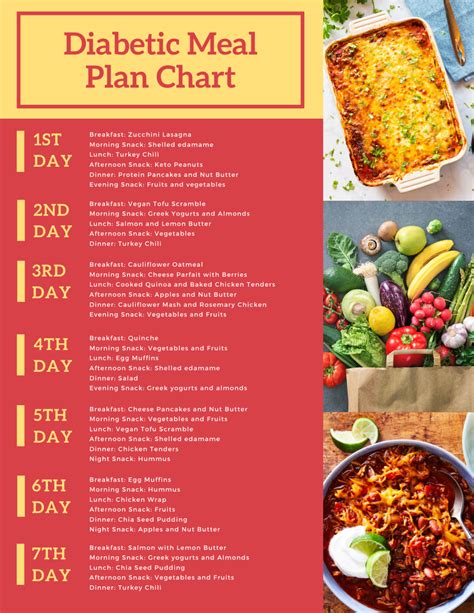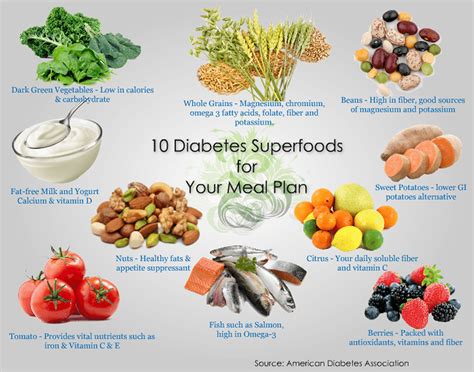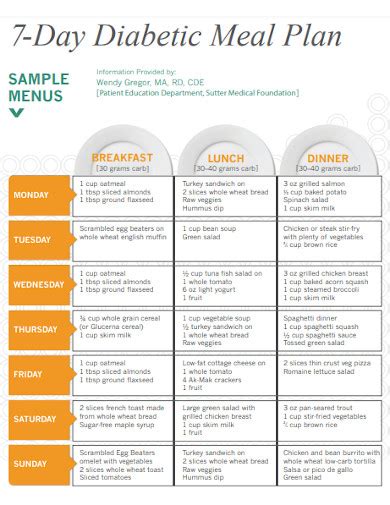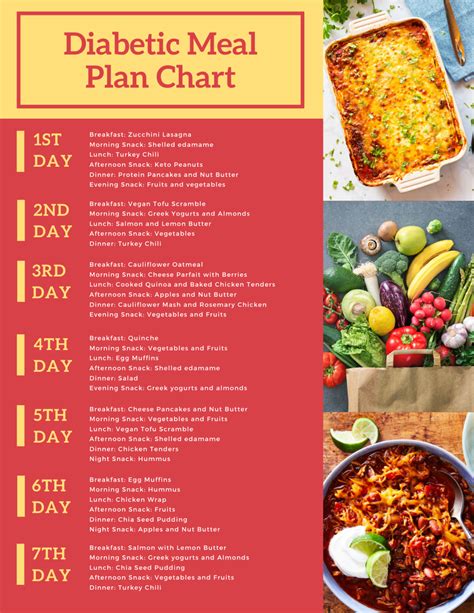Intro
Discover 5 diabetic meal tips for managing blood sugar, including healthy eating plans, balanced nutrition, and smart food choices to control diabetes symptoms and improve overall well-being.
Living with diabetes requires careful attention to diet and nutrition. Managing blood sugar levels through meal planning is crucial for individuals with diabetes. A well-planned diet helps control blood sugar levels, maintains a healthy weight, and prevents complications associated with diabetes. With the right approach, individuals with diabetes can enjoy a variety of delicious and nutritious meals while keeping their condition under control.
Effective meal planning for diabetes involves understanding the importance of balanced nutrition, portion control, and the timing of meals. It's essential to focus on whole, unprocessed foods like vegetables, whole grains, lean proteins, and healthy fats. These foods provide essential nutrients, fiber, and satiety, making it easier to manage blood sugar levels and maintain a healthy weight. By making informed food choices and developing healthy eating habits, individuals with diabetes can improve their overall health and well-being.
A key aspect of diabetic meal planning is understanding how different foods affect blood sugar levels. Foods with a high glycemic index, such as white bread and sugary snacks, can cause a rapid spike in blood sugar, while foods with a low glycemic index, such as whole grains and non-starchy vegetables, have a more gradual effect. By choosing foods with a low glycemic index and balancing carbohydrate intake with protein and healthy fats, individuals with diabetes can better manage their blood sugar levels and reduce the risk of complications.
Understanding Diabetic Meal Planning

Key Principles of Diabetic Meal Planning
The key principles of diabetic meal planning include: * Eating regular, balanced meals to maintain stable blood sugar levels * Choosing whole, unprocessed foods as the primary source of nutrition * Limiting or avoiding foods that are high in added sugars, saturated fats, and sodium * Drinking plenty of water and limiting sugary drinks * Being mindful of portion sizes and carbohydrate intakeBenefits of Healthy Eating for Diabetes

Importance of Fiber in Diabetic Meal Planning
Fiber is an essential nutrient in diabetic meal planning, as it can help slow the digestion and absorption of carbohydrates, reducing the impact on blood sugar levels. Foods high in fiber, such as whole grains, fruits, and vegetables, can also help promote feelings of fullness and satisfaction, making it easier to manage weight and maintain a healthy diet.Practical Tips for Diabetic Meal Planning

Managing Carbohydrates in Diabetic Meal Planning
Managing carbohydrates is a critical aspect of diabetic meal planning, as carbohydrates have a significant impact on blood sugar levels. Individuals with diabetes should focus on whole, unprocessed sources of carbohydrates, such as whole grains, fruits, and vegetables, and limit or avoid refined and processed sources, such as white bread and sugary snacks.Common Mistakes in Diabetic Meal Planning

Importance of Physical Activity in Diabetic Meal Planning
Physical activity is an essential component of diabetic meal planning, as regular exercise can help improve blood sugar control, reduce the risk of complications, and promote overall health and well-being. Individuals with diabetes should aim for at least 150 minutes of moderate-intensity aerobic exercise per week, as well as incorporate strength-training and high-intensity interval training into their routine.Conclusion and Next Steps

We invite you to share your thoughts and experiences with diabetic meal planning in the comments below. If you have any questions or concerns, please don't hesitate to reach out. Share this article with friends and family who may benefit from learning more about diabetic meal planning.
What is the importance of fiber in diabetic meal planning?
+Fiber is essential in diabetic meal planning as it helps slow the digestion and absorption of carbohydrates, reducing the impact on blood sugar levels. Foods high in fiber, such as whole grains, fruits, and vegetables, can also help promote feelings of fullness and satisfaction, making it easier to manage weight and maintain a healthy diet.
How can I manage carbohydrates in diabetic meal planning?
+Managing carbohydrates is a critical aspect of diabetic meal planning. Focus on whole, unprocessed sources of carbohydrates, such as whole grains, fruits, and vegetables, and limit or avoid refined and processed sources, such as white bread and sugary snacks. Tracking carbohydrate intake and adjusting portion sizes can also help maintain stable blood sugar levels.
What are common mistakes in diabetic meal planning?
+Common mistakes in diabetic meal planning include not planning meals in advance, not tracking carbohydrate intake, not staying hydrated, and not seeking support from a healthcare provider or registered dietitian. These mistakes can lead to poor blood sugar control, inadequate nutrition, and increased risk of complications.
